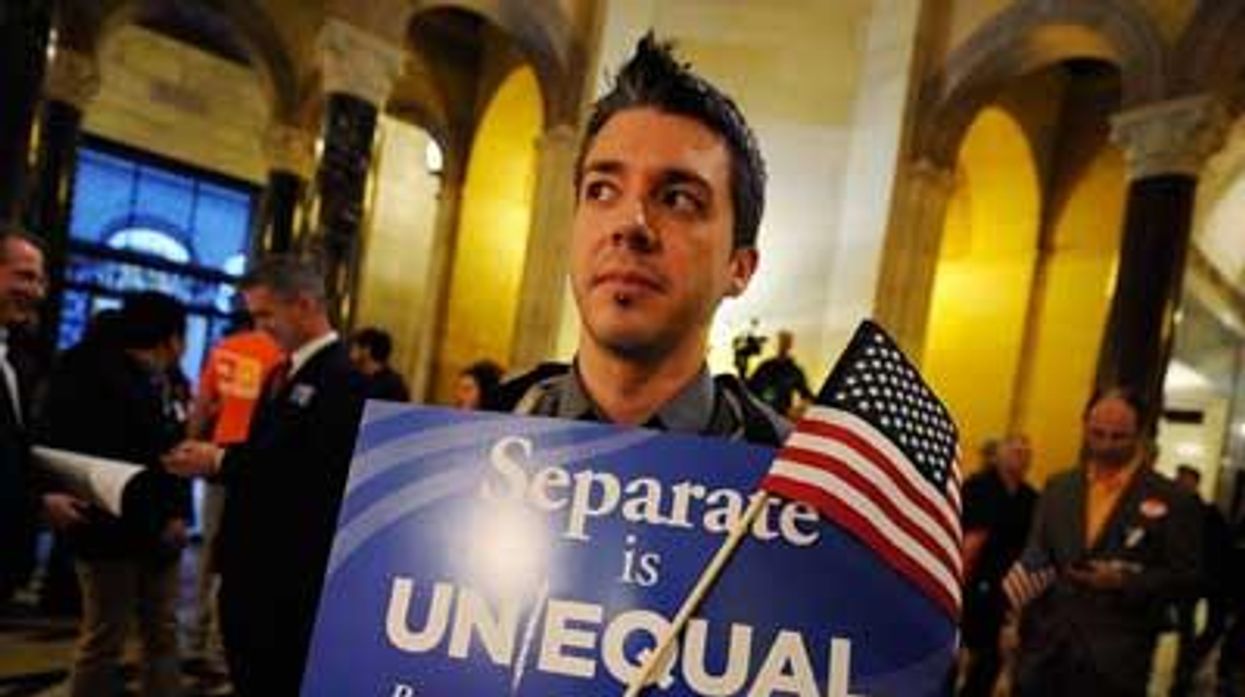Health
Will Obama's Marriage Support Be a Boon for Benefits?
Will Obama's Marriage Support Be a Boon for Benefits?

May 15 2012 5:00 AM EST
By continuing to use our site, you agree to our Privacy Policy and Terms of Use.
Will Obama's Marriage Support Be a Boon for Benefits?
Will Obama's Marriage Support Be a Boon for Benefits?

President Obama's pronouncement last week in favor of same-sex marriage has no legal effect on employers' decisions on whether to offer benefits to workers' domestic partners, but some advocates believe it could reinforce a decade-long trend toward coverage.
Last year, 52 percent of all employers offered domestic partner health benefits, with the percentage varying widely by region and industry, according to a nationally representative sample of about 3,000 employers surveyed by benefit consultant Mercer. That's up from 31 percent in 2010.
The biggest factors driving that change are employers' views on whether such benefits help them attract and retain desirable workers.
"Employers started doing this because they felt they needed to be competitive in the labor market, just like with other benefits," said Paul Fronstin of Employee Benefit Research Institute, a think tank in Washington D.C. "I don't see that changing."
The Village Voice newspaper in New York is credited with being the first private employer to offer workers domestic partner benefits in 1982. In 1995, Vermont became the first to offer coverage to state workers.
"There's been a steady growth for a long time," says Joan Smyth, a partner at Mercer. In the early days, some employers worried that adding coverage for domestic partners could make their costs skyrocket by attracting people with higher-than-average health risks, she said, but "that did not happen."
The District of Columbia and almost half of states currently offer benefits to domestic partners or same-sex spouses of state workers, according to the advocacy group Human Rights Campaign.
Same-sex partners of federal workers are not eligible for coverage under the Federal Employees Health Benefits Program (FEHB) because the Defense of Marriage Act, passed in 1996 and signed into law by President Bill Clinton, defines marriage as a legal union between a man and woman, the FEHB website says. That law is being challenged and may well end up before the Supreme Court. The Obama administration has said it will not defend the statute.
In the Mercer survey, coverage of same-sex partners was most common in the West, with 79 percent of large employers offering such benefits. It was least common in the South, at 28 percent. Big differences were also noted within industries. Among manufacturing firms, for example, the coverage rate ranged from a high of 96 percent for pharmaceutical companies to 18 percent for machinery and heavy equipment makers.
Public sector jobs had a lower rate of coverage, averaging 26 percent across state, county and municipal workers, the Mercer survey found.
While Smyth at Mercer doesn't think the president's pronouncement will sway employers, the Human Rights Campaign's state legislative director Sarah Warbelow has a different take.
"Hearing the president supports this as well makes this even easier for corporations to get on board," says Warbelow, adding that 58 percent of Fortune 500 companies currently offer domestic partner benefits. Some of those companies limit those benefits to same-sex couples, while others include domestic partners of opposite sexes.
The climate remains volatile, particularly for state and municipal employees. What, for example, will happen in states like North Carolina that passed a ban on same-sex marriage and have municipalities that offer domestic partner benefits to government workers?
With last week's vote in North Carolina, there are at least 31 states that bar gay marriage.
In North Carolina, attorneys for cities such as Carrboro and Chapel Hill are still evaluating whether they can continue to offer domestic partner benefits, according to reports from the area's local NBC television affiliate.
"We have employees asking us, 'What's going to happen?' These are people who otherwise wouldn't have health care, children who wouldn't have health care," Chapel Hill Mayor Mark Kleinschmidt told NBC-17 in Raleigh, N.C.
Court decisions in other states with similar laws have split on whether domestic partnership benefits can be retained for state or municipal workers, says Warbelow.
Meanwhile, private-sector employers must contend with a confusing array of state laws governing the types of unions residents may enter.
Eight states and the District of Columbia have passed laws to allow same-sex couples to marry, for example, while an additional nine allow civil unions or domestic partnerships, which offer many, if not all of the same legal protections as marriage.
While many employer health programs are exempt from state law because they are self-insured, some employers buy coverage from insurers that are subject to state rules.
Employers who buy coverage from insurers in those states must follow that state's law, even if the employees live another state, Smyth says.
A separate Mercer report out last week gave an example set in Virginia: "Ellen and Sue live in Virginia, which doesn't permit same-sex marriage. Ellen works in Washington, D.C., and is covered by a group health insurance policy issued in D.C., which must cover same- and opposite-sex spouses equally. Ellen and Sue marry in D.C., even though they live in Virginia. Ellen may add Sue to her health coverage because they are lawfully married and covered by a D.C. policy."
Employers are "focused on this right now and are watching" the changing political landscape to make sure they are in compliance with the rules, says Smyth. "They need to be really careful that they know the laws."
KAISER HEALTH NEWS is an editorially independent program of the Henry J. Kaiser Family Foundation, a nonprofit, nonpartisan health policy research and communications organization not affiliated with Kaiser Permanente.
Charlie Kirk DID say stoning gay people was the 'perfect law' — and these other heinous quotes